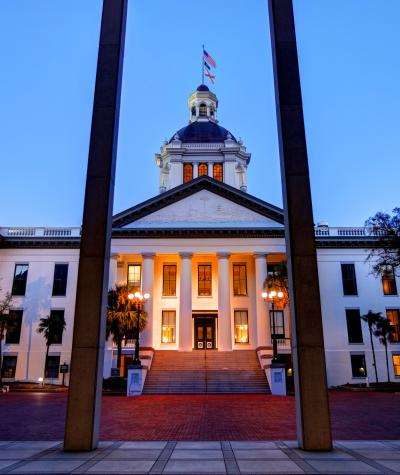The Florida Legislature has approved a sweeping election bill, S.B. 524, which would limit voters’ freedom to vote and open the door for voter intimidation and harassment by a new partisan agency under the governor’s control.
This bill would also purge thousands of registered voters from the rolls by increasing the frequency of voter registration cancellations, making it a felony to assist voters by collecting and returning more than two mail ballots, and establishing an unnecessary and expensive statewide agency to investigate and prosecute election-related criminal offenses.
S.B. 524 is likely to be signed into law by Gov. Ron DeSantis, meaning the bill’s anti-voter measures could be in effect during Florida’s 2022 primary election this summer.
Central to this bill is the formation of the Office of Election Crimes and Security, an unnecessary and expensive permanent agency within the Florida Department of State dedicated to investigating election crimes.
Even though the 2020 election in Florida was safe and secure — and was touted as such by Gov. DeSantis, the chair of the Florida Republican Party and local election officials across the state — Florida is poised to become one of the first states in the country to establish such an agency.
S.B. 524 would empower this new agency to conduct independent inquiries into alleged election crimes and allow Florida’s governor to appoint their own “special officers” in every regional office of the State Department of Law Enforcement.
This would give partisan state politicians even more control over how elections are conducted and scrutinized, a role traditionally held by nonpartisan election administrators and independent law enforcement agencies.
This approach to election security is a solution in search of a problem. Florida’s Department of State already has authority to receive election-related complaints and allegations and typically refers any alleged election crimes to local law enforcement authorities for further investigation and, if necessary, prosecution.
The criminalization of the election process could be weaponized to target election officials who make honest mistakes and intimidate or harass minority voters and other vulnerable communities to discourage them from going to the polls.
While Florida’s S.B. 524 would be the first bill to create a statewide election crimes agency of this sort, state politicians elsewhere have taken notice.
In Arizona, S.B. 1027 would establish the Bureau of Elections within the governor’s office, a new agency empowered to enforce election law through probes and civil or criminal penalties, cutting the Secretary of State, local election officials and existing county law enforcement offices out of the process of enforcing election laws.
Another Arizona bill, S.B. 2380, would allow anyone to submit an anonymous complaint to the Election Integrity Unit in the attorney general’s office and expand the attorney general’s authority to investigate and prosecute those who help voters submit their mail ballots in local and county elections.
In Georgia, a gubernatorial candidate has touted a plan reminiscent of the Florida bill that would establish an “Election Law Enforcement Division” that would "be charged with enforcing election laws, investigating election crimes and fraud, and arresting those who commit these offenses."
Since the 2020 elections, there has been a surge of state-level legislation attempting to undermine the freedom to vote and subvert the electoral process. According to the Brennan Center for Justice, 19 states implemented 34 laws limiting the freedom to vote in 2021.
Legislators in at least 27 states have introduced, pre-filed or carried over 250 bills that would restrict voting access or increase the risk of election sabotage in 2022.
Elections should be decided by voters, not partisan politicians. Ultimately, state laws that give partisan actors more influence over election administration and unnecessarily criminalize the civic participation of both nonpartisan election officials and voters are harmful to democracy.
Florida’s S.B. 524 not only presents a concerning avenue for partisan politicians to raise baseless doubts about legitimate election results, but it also creates serious burdens on Florida voters’ freedom to vote. Floridians, like all Americans, deserve free and fair elections without expensive, unnecessary and deliberate barriers to the ballot box.
